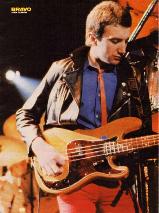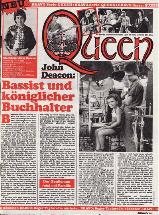Bassist and Royal Accountant
* Thanks Alison for translation *
(BRAVO, May 1981)

|

|
Bassists are a breed apart. They prefer to stay in the background and allow lead singers or solo guitarists to take precedence on stage, being the ones who are in the limelight, the ones fans mainly cheer. John Deacon, a colleague of Freddie Mercury, Roger Taylor and Brian May for exactly ten years, is no exception. "I'm the calming influence. I don't run around as much as the others. That isn't me,"he says.
John, who will be 30 on 19 August, is happy with his role. He rates it as highly as that of the others in Queen. It would be just as unacceptable to be without John as without Freddie. "The reason why we're so good is because we're so different. Each has his special abilities, which he employs for the band in his own way. The end result is a unique whole which is called Queen."
Whoever speaks with John Deacon quickly notices what he means. He is the careful, thorough and consistent one. John rarely answers a question spontaneously - he reviews it and tries to be as precise as possible.
"I take care of the business side of Queen. Since we manage ourselves, each of us has taken over certain tasks, and because I was always good at mathematics, it was somehow a matter of course that the function of Queen's accountant fell to me. I enjoy it. The business side of an enterprise like ours can be just as exciting as an important concert."
What John doesn't mention is that Freddie, Brian and Roger are very happy that one person in Queen knows his way around figures just as well as he does around notes. If John gives his Okay to a contract, the others agree without hesitation. Nothing gets past the qualified electrician who once graduated from Chelsea College with the highest class of honours.
But nobody should make the mistake of underestimating John as far as music is concerned just because he rarely mentions his achievements in this area. Modesty fits John better than all the showbiz carryings-on.
Mr. Deacon is, for example, composer of the Queen hit 'Another One Bites the Dust', a song on which he correspondingly makes it big on his bass guitar.
He reports honestly about the internal fights in the group when it comes to a new song: "It's not a matter of money, but of ego. We sit and argue because each one wants as many songs as possible on a new LP, of course. It can sometimes get really heated. But that's healthy for the atmosphere in the band and no cause for concern. Roger came along the last time with so many ideas that for him it was the right time for a solo LP. That's a better outlet than an ever stronger dissatisfaction in the group."
The Gentleman travels with family
John Deacon, for whom the description of 'gentleman' fits well, looks on the future of Queen with confidence. "We're not little children, but people with a good upbringing and good education. We avoid the mistakes that we see others make."
One of those is an over-extensive tour schedule. "We get on each other's nerves after a while. Then trouble starts up, and that rubs off on the show. A remedy for that is dividing tours up into single blocks and having holidays from each other in between." Another is to bring company along.
John, who often complains of being too shielded from the general public, often travels with his wife Veronica and his children Robert, Michael and Laura. "I need my family around me. Otherwise I simply get homesick. Besides, you don't meet so many people on the road who you can talk to."
At the time when John played with the others for the first time (he replaces Jim staffell (sic) with whom Brian, Freddie and Roger had founded a group called 'Smile'), John was the perfect 'Jack of all Trades'. When Queen started out he took care of the functioning of the amplifier system and the lighting.
Today he shudders at the memory of it. "We're all perfectionists, but when you're with a band still in its infancy with no money, that's not exactly easy. My patience humour came in handy for that."
For a long time now dozens of technicians have been taking care of the complicated business with the electronics. But John, who originally at the age of twelve wanted to have the rhythm guitar as his instrument, keeps an eye on the technical equipment. And that suits him: "I don't want to lose contact with reality, not bothering with anything anymore and one day standing there helpless. That's why I value the recording work in the studio so much: you're fending much more for yourself there."
Non-smoking and seldom drinking, John explains his reserved, down-to-earth and quiet and very English way with a simple attitude to life: "Just don't overdo anything."